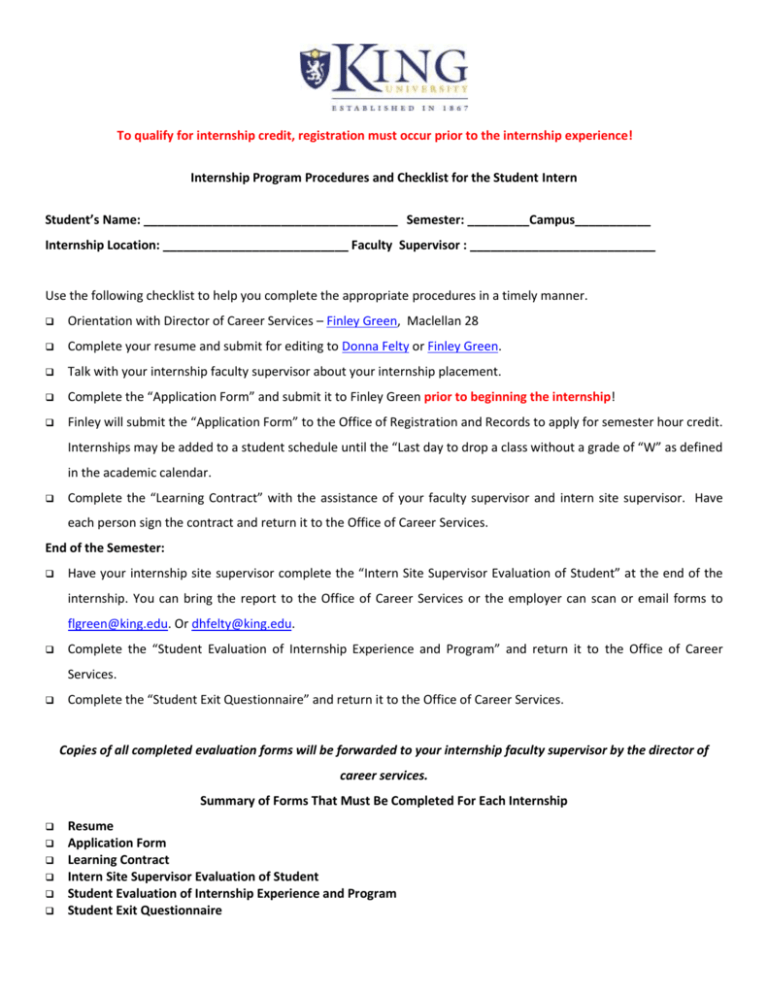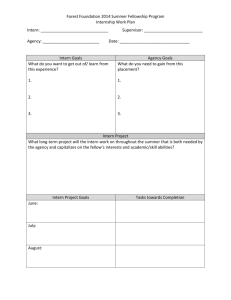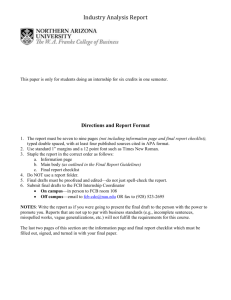Internship Policies and Procedures
advertisement

To qualify for internship credit, registration must occur prior to the internship experience! Internship Program Procedures and Checklist for the Student Intern Student’s Name: _____________________________________ Semester: _________Campus___________ Internship Location: ___________________________ Faculty Supervisor : ___________________________ Use the following checklist to help you complete the appropriate procedures in a timely manner. Orientation with Director of Career Services – Finley Green, Maclellan 28 Complete your resume and submit for editing to Donna Felty or Finley Green. Talk with your internship faculty supervisor about your internship placement. Complete the “Application Form” and submit it to Finley Green prior to beginning the internship! Finley will submit the “Application Form” to the Office of Registration and Records to apply for semester hour credit. Internships may be added to a student schedule until the “Last day to drop a class without a grade of “W” as defined in the academic calendar. Complete the “Learning Contract” with the assistance of your faculty supervisor and intern site supervisor. Have each person sign the contract and return it to the Office of Career Services. End of the Semester: Have your internship site supervisor complete the “Intern Site Supervisor Evaluation of Student” at the end of the internship. You can bring the report to the Office of Career Services or the employer can scan or email forms to flgreen@king.edu. Or dhfelty@king.edu. Complete the “Student Evaluation of Internship Experience and Program” and return it to the Office of Career Services. Complete the “Student Exit Questionnaire” and return it to the Office of Career Services. Copies of all completed evaluation forms will be forwarded to your internship faculty supervisor by the director of career services. Summary of Forms That Must Be Completed For Each Internship Resume Application Form Learning Contract Intern Site Supervisor Evaluation of Student Student Evaluation of Internship Experience and Program Student Exit Questionnaire Career Services Internship Program Overview The King University Internship Program is designed to give students an opportunity to have a paid or non-paid learning experience in an off-campus setting related to the student’s area of academic specialization and potential career. The program is generally limited to juniors and seniors because greater maturity and the completion of some foundational course work enhance its value. The purposes of the program are to give the student an opportunity to gain valuable work experience; to explore vocational goals, to apply knowledge and abilities gained in the classroom, and to understand the implications of a particular field for faith and life. An internship is a valuable way to gain work experience in areas that you find interesting. It can help you decide whether to pursue a certain career field. It can also provide job market contacts and relevant experience, which help you compete for jobs after graduation. Typical internships involve planning, working on and completing a specific project. Internships provide students with a competitive edge in today’s job market. Internships help students develop a clearer sense of career objectives and increase their motivation for school. In addition, internships develop students’ professional and personal skills, help them start the process of networking early, and place the student in contact with potential employers. Non-credit opportunities to learn firsthand about various professions are also available and should be considered by first-year students and sophomores. Intern placements can be arranged in a number of fields. A committee of three people will supervise each intern student: the on-site intern supervisor, the internship faculty supervisor, and the internship director. The student, faculty supervisor, and intern site supervisor will draw up a learning contract, which will specify the requirements of the intern work experience. Students are given an on-campus orientation before starting their internship. The onsite work supervisor provides day-to-day guidance during the internship. The faculty supervisor is to be kept informed about the development of the internship and, along with the internship director, is available for consultation and assistance at any time. Both the student and the on-site intern supervisor will complete evaluation forms at mid-semester and at the end of the semester. Three critical persons work directly with the student to plan and review the internship: Faculty supervisor: A faculty member of King University will be asked to assist in setting up and supervising the student’s internship. The faculty supervisor will normally be chosen from the academic area most closely related to the internship experience. The faculty supervisor will periodically discuss the internship with the student during the course of the semester and consult with the on-site supervisor as needed. Intern site supervisor: The on-site intern supervisor will be the individual under whom the student is interning. The site supervisor should orient the student to the work place, observe the student’s work, interact constructively with the student about the demands of the field, and encourage the student to fulfill the terms of the internship learning contract. At the end of the semester, the intern supervisor should complete a performance evaluation form and send it to the internship director. It is recommended that the site supervisor discuss these two evaluations with the intern student. Director of internship program: The Director of Career Development Donna Felty and the Director of Career Services Finley Green, are responsible for the overall operation of the program. The directors interpret the program to the general community and to King University, assists students in finding suitable intern job placements, help resolve problems, and monitor the general quality of the program. While each internship placement is a unique experience, the following general procedures are required: Application form: An internship requires more student initiative than many other University learning experiences. The student must complete the application (in conjunction with the faculty supervisor) form prior to the beginning of the internship placement (or before the announced deadline). The application gives the internship director essential information about the student, and confirms that a King University faculty member is willing to provide supervision. The original is kept by the Director of Career Services and scanned to the Registrar. On-campus orientation: Students will be required to participate in an on-campus orientation session prior to beginning their internship. The staff and faculty will review guidelines and procedures of the internship program and share information on making the most of this learning experience. Learning contract: After being approved for participation, the student will complete the learning contract in consultation with the Career Services director, the faculty supervisor and the on-site intern supervisor. In completing the contract, the student should be as specific as possible. While written and reading assignments will vary, the faculty supervisor and the student will devise a plan that insures that the internship will be a valid learning experience. The student then takes the contract to the various people involved and secures their signatures. The last person to sign the contract will be the Career Services director. If the contract is approved, it will then be duplicated and a copy sent to the student, the on-site intern supervisor, and the faculty supervisor. The original will be filed in the Career Services office. This process should be completed before the internship formally begins. Evaluations and exit questionnaire: Both the on-site intern supervisor and the student are asked to complete final evaluation forms. These should be sent to the Director of Career Services at the end of the semester. The intern student is also required to complete an exit questionnaire. Grades: The internship is graded on a pass/fail basis. At the completion of the internship, the faculty supervisor, in relation to the learning contract and program guidelines, assigns the grade of pass or fail. Upon successful completion of the program the student is awarded academic credit (one credit hour per 50 on-site hours). Failure to comply with the deadlines may result in an incomplete on your transcript. A Maximum of 6 Hours of internship credit can be applied toward graduation. Questions may be directed to Finley Green or Donna Felty Finley Green flgreen@king.edu 423 652-4865 Donna Felty dhfelty@king.edu 423 652-4752 Career Development Tips for Internship Success Top 10 Tips for Interns From: FastWeb Resources By Bradley Richardson 1. Don’t be afraid to talk with people Don’t be intimidated because you are a student. People are sometimes too busy to roll out the red carpet so you have to make the first move to talk with coworkers and supervisors. 2. Ask for things to do. Don’t wait to be told what to do. Solving problems and taking initiative are the best ways to stand out from the crowd. 3. Learn all you can about the industry. Talk with people in different departments as well as clients and vendors. 4. Read everything you can get your hands on. You won’t find everything you need to know in the training manual. Reading contracts, letters, memos, press releases and trade publications will help you become informed on all elements of the business. 5. Don’t gripe about the grunt work. There is always something more to learn. How long you do grunt work depends on what you make of it. Everything has a purpose, so learn how the small tasks fit into the big picture. 6. Milk the fact that you are a student. As a student, you aren’t threatening and can have more access and opportunities than a full-time employee. Everyone wants to help a student learn. 7. Hitch your wagon to a star. Learn from the people who are the superstar performers and most respected individuals in the office. 8. Get in the information loop. Decisions aren’t always made in a conference room. 9. Ask to attend meetings and events. You will learn how things really get done. 10. Don’t burn any bridges. You never know when you will see someone later in your career.








